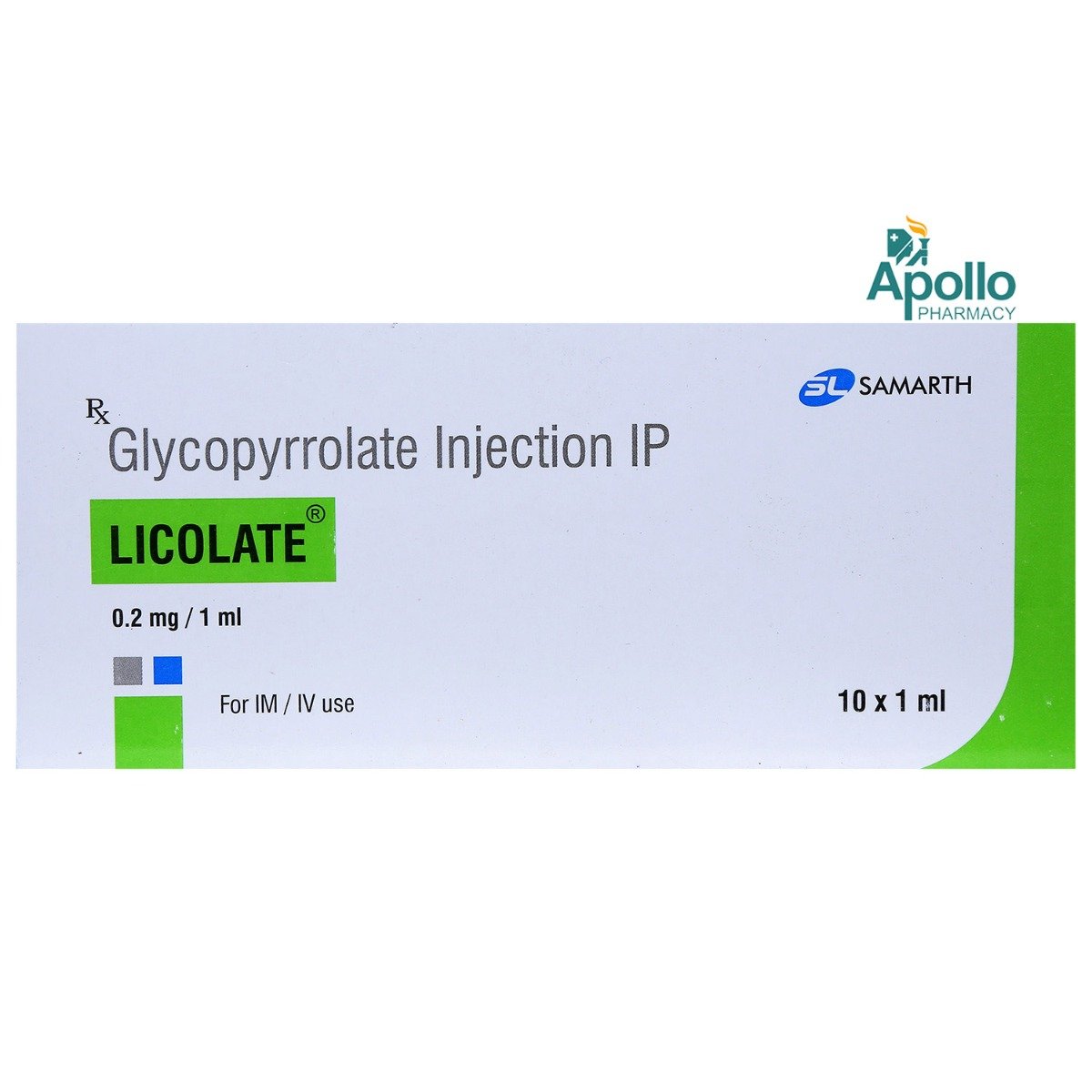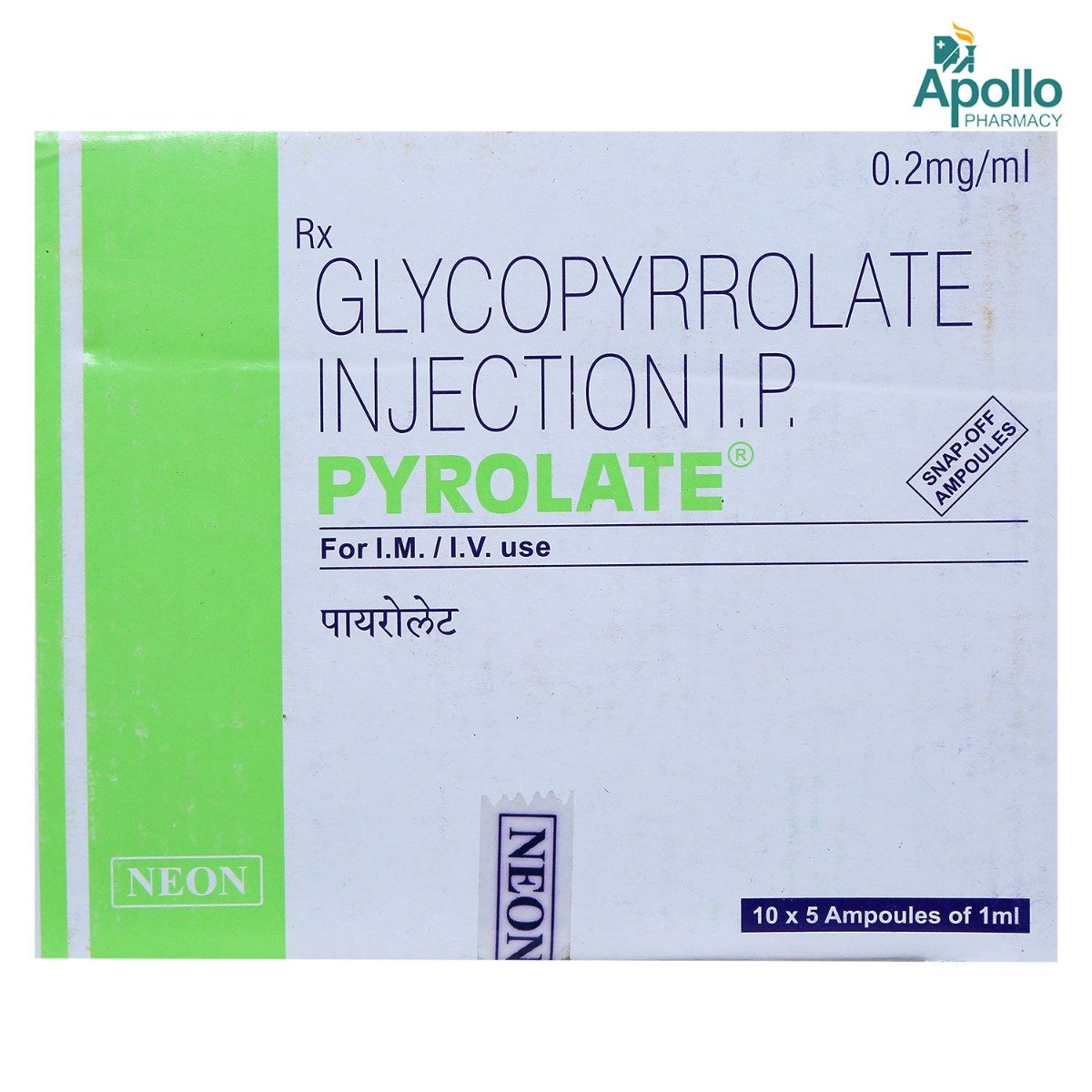- Home
- Gpyrolon 0.2mg Injection
Gpyrolon 0.2mg Injection Substitute
Gpyrolon 0.2mg Injection Substitute
Medicine Composition:
GLYCOPYRROLATE-0.2MGAll Substitutes & Brand Comparisons
RX
Out of StockPyrolin 0.2mg Injection
₹12.85
(₹11.56 per unit)
4% CHEAPERRX
Pyrolate Injection 10 ml
Neon Laboratories Ltd
₹142
(₹12.78/ 1ml)
5% COSTLIERRX
Out of StockThemipyrrnom 0.2 Injection 1 ml
Themis Medicare Ltd
₹14.5
(₹13.05/ 1ml)
7% COSTLIERRX
Out of StockGpyrolon 0.2 mg Injection 1 ml
Celon Laboratories Pvt Ltd
₹15
(₹13.5/ 1ml)
11% COSTLIERRX
LICOLATE INJECTION 1ML
₹15
(₹13.5/ 1ml)
11% COSTLIERRX
PYROTROY INJECTION 1ML
Troikaa Pharmaceuticals Ltd
₹15
(₹13.5/ 1ml)
11% COSTLIERRX
Out of StockGlypro 0.2 mg/ml Injection 1 ml
Jackson Laboratories Pvt Ltd
₹16.5
(₹14.85/ 1ml)
22% COSTLIERRX
Themipyrnom 0.2 mg Injection 1 ml
Themis Medicare Ltd
₹15
(₹15.0/ 1ml)
23% COSTLIERRX
Out of StockPyrofit 0.2 Injection 1 ml
Swiss Pharma Pvt Ltd
₹137.9
(₹124.11/ 1ml)
924% COSTLIER

When Should You Consider Switching from Gpyrolon 0.2mg Injection?
Patients may explore substitutes in the following scenarios:
- High monthly cost of Gpyrolon 0.2mg Injection
- Non-availability in local pharmacies
- Generic recommendation by a doctor
- Side effects or better tolerability with alternatives
What to Know Before Switching
Before you switch from Gpyrolon 0.2mg Injection to another medicine, here are some important points to keep in mind:
Same salt, different brands:
Most substitutes contain the same active ingredient - GLYCOPYRROLATE-0.2MG, but the fillers, coating, or manufacturing quality may vary slightly.
Consult your doctor first:
Even if the salt is the same, your doctor can confirm if the substitute is right for your condition, dosage, and health history.
Watch out for allergies or reactions:
Some people may react differently to certain brands due to inactive ingredients. If you notice any side effects, inform your doctor immediately.
Price ≠ effectiveness:
A lower-priced substitute doesn't mean it's less effective. Many generic medicines work just as well as branded ones.
Check the dosage form and strength:
Always match the substitute’s strength (e.g., 5mg, 10mg) and form (tablet, capsule, syrup) with what your doctor prescribed.
Uses
Gpyrolon 0.2mg Injection is used to treat various medical conditions. The detailed uses are as follows:
- Reduction of preoperative secretions: It decreases saliva, tracheobronchial, and pharyngeal secretions to help maintain a clear airway during surgery.
- Prevention and treatment of intraoperative bradycardia: It helps manage a slow heart rate during anaesthesia or surgical procedures.
- Adjunct to anaesthesia: It minimises airway secretions and suppresses certain reflexes during anaesthesia, improving surgical safety and patient comfort.
Medicinal Benefits
- Gpyrolon 0.2mg Injection contains Glycopyrrolate, which belongs to the group of medicines called anticholinergics.
- Used during anaesthesia to reduce airway and gastric secretions, including the volume and acidity of gastric secretions.
- Helps block cardiac inhibitory reflexes during induction of anaesthesia and intubation.
- Used during surgery to manage arrhythmias caused by surgery, drugs, or vagal reflexes.
- Protects against peripheral muscarinic effects of cholinergic agents.
- Also used as adjunct therapy for treating peptic ulcers when an immediate anticholinergic effect is needed or when oral medication is not possible.
- Works by inhibiting acetylcholine, thereby reducing gastric acidity and controlling excessive pharyngeal, bronchial, and tracheal secretions.
FAQs
The substitutes of Gpyrolon 0.2mg Injection contain the same active salt(s) - GLYCOPYRROLATE-0.2MG. However, they may differ in price, manufacturing quality, and inactive ingredients. Speak to your doctor to find a suitable option.
Switching to a generic substitute medicine in the place of Gpyrolon 0.2mg Injection is often possible if it has the same salt, strength, and dosage form. But always check with your doctor before making any changes to your medication.
Generics versions of Gpyrolon 0.2mg Injection are typically more affordable because they don’t include the original brand's research, development, and marketing costs. They contain the same active ingredient and are approved for safety and effectiveness.
Most people don’t notice any difference. However, some may react to different fillers or coatings. If you notice any unusual symptoms after switching, consult your doctor.
Make sure the new medicine has the same active salt, strength, dosage form. Always confirm the change with your doctor or pharmacist.
Substitutes of Gpyrolon 0.2mg Injection meet the same safety and efficacy standards as Gpyrolon 0.2mg Injection, but small differences in absorption or formulation can exist. A doctor can help you choose the right one for your needs.
Yes. Substitutes of Gpyrolon 0.2mg Injection may vary in color, size, or shape due to differences in manufacturing and branding, but this does not affect how they work.
Yes, it’s generally safe to switch between multiple substitutes of Gpyrolon 0.2mg Injection if they have the same salt and strength. However, always inform your doctor so they can monitor how your body responds.
Yes, many people safely use substitutes of Gpyrolon 0.2mg Injection for long-term treatment. Just ensure it’s done under medical supervision.
If your symptoms stay under control or lab results remain stable, the substitute for Gpyrolon 0.2mg Injection is likely working well. Regular follow-ups with your doctor are important.
Absolutely. Even with the same salt, small differences can affect how your body responds when switching from Gpyrolon 0.2mg Injection to its substitute. Always consult your doctor before switching.
Gpyrolon 0.2mg Injection is used to reduce secretions from the mouth, throat, or stomach (such as saliva or stomach acid), to avoid cardiac rhythm issues during anesthesia, intubation, or surgery, or to minimize side effects from specific medications (such as pyridostigmine and neostigmine).
Dry mouth could be a side effect of Gpyrolon 0.2mg Injection. Limiting caffeine intake, avoiding smoking, drinking water regularly, and chewing sugar-free gum/candy might stimulate saliva, thereby preventing drying of the mouth.
Gpyrolon 0.2mg Injection may cause heat prostration (overheating of the body due to severe weather conditions). You are advised to avoid high environmental temperatures.
Gpyrolon 0.2mg Injection may cause mydriasis (pupil dilation) and increased intraocular pressure in patients with glaucoma. Inform your doctor if you have glaucoma or ocular hypertension.
Gpyrolon 0.2mg Injection may cause tachycardia (increased heart rate). Inform your doctor if you have heart rate problems. Gpyrolon 0.2mg Injection should be used with caution in patients with cardiac arrhythmia, congestive heart failure, coronary artery disease, high blood pressure, and hyperthyroidism.
Gpyrolon 0.2mg Injection works by inhibiting the action of acetylcholine. Thus, it reduces the volume and free acidity of gastric secretions and controls excessive pharyngeal, bronchial, and tracheal secretions.




